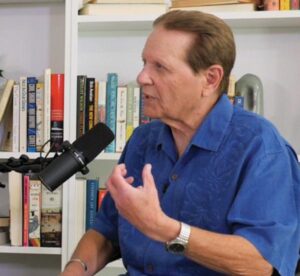by Bob Avakian
March 2, 2020
In an article in the New York Times, February 21, 2020, “Why Sanders Will Probably Get the Nod,” David Brooks attempts to equate Bernie Sanders with Donald Trump because, according to Brooks, each in his own way is a purveyor of a fraudulent but “successful” myth—a right-wing populist myth in Trump’s case, and a left-wing populist myth with Sanders. This is ridiculous. Such an attempt to make Sanders equivalent to Trump (or the “mirror opposite” or “left-wing doppelganger” of Trump) is refuted by simply looking at the obvious reality.
As will be discussed here, Sanders does, in an ultimate sense, share with Trump the fact that he is actually an advocate of the capitalist system and a representative and defender of the interests of U.S. capitalist imperialism. But that does not negate the very real and sharp differences between Sanders and Trump, within that same ultimate framework. Does Sanders promote racism and bigotry, misogyny (hatred of women) and vile prejudice and violence toward LGBT people, as Trump and those associated with him actively do? Does Sanders, like Trump, defy the science of climate change, denying that there is a serious and accelerating climate crisis in which human activity is a major factor, while encouraging and facilitating the unrestrained ravaging of the environment? Has Sanders acted to undermine the principles of a constitutional capitalist republic and the rule of law, as Trump continues to do, in an escalating way? And, for that matter, does what Brooks characterizes as Sanders’ “myth” really have anything in common with what Trump peddles? Is there really no truth to Sanders’ claim that the super-rich—heads of banks and other financial institutions, tech companies, other large business interests, and so on—wield an undue influence over political affairs and the affairs of society in general? Is that really in the same category as the systematic lies and lunatic conspiracy theories that Trump consistently repeats and promotes, which are filled with racism and bigotry, misogyny, and xenophobia? Brooks, in equating Sanders with Trump, has allowed himself to depart from reality and descend into demagogic “cheap trickery” that would embarrass a clumsy con man.
Brooks is a “conservative” commentator, who opposes Donald Trump, and he fancies himself something of a philosopher who seeks to illuminate the common social good that can unite people beyond “tribal” partisan conflict. But, in fact, Brooks is a promoter of the biggest myth of all—that capitalism is the best possible system whose functioning and effect brings about the greatest good, not just for a small class of capitalists but for the masses of humanity, and that American capitalism is the shining example and model of this. The truth is that capitalism is today a worldwide system of capitalist imperialism that maintains itself through ruthless exploitation and oppression of billions of people throughout the world and perpetual violence—against masses of people, and against the environment. And this is true, above all, for U.S. capitalist imperialism, and its crimes against humanity, for which Brooks has also been an active promoter and apologist.
So, for example, when in 2003 the U.S. invaded Iraq, in blatant violation of international law and on the basis of repeated, systematic lies that the Iraqi government headed by Saddam Hussein had weapons of mass destruction (and was somehow connected with those who carried out the September 11, 2001 attacks in the U.S.), Brooks was an arrogant, aggressive advocate for that war, which unleashed a maelstrom of death and destruction in that part of the world; and he has continued to fabricate excuses and rationalizations for that war, which fly in the face of the clearly established facts.
The Reality of Capitalism, the Limitations and Essence of Social Democracy
As for the “great good” that capitalism represents and is doing in the world, as I have pointed out, in a world dominated by this system of capitalism-imperialism:
large parts of humanity live in stark poverty, with 2.3 billion people lacking even rudimentary toilets or latrines and huge numbers suffering from preventable diseases, with millions of children dying every year from these diseases and from starvation, while 150 million children in the world are forced to engage in ruthlessly exploited child labor, and the whole world economy rests on a vast network of sweatshops, employing large numbers of women who are regularly subjected to sexual harassment and assault, a world where 65 million refugees have been displaced by war, poverty, persecution, and the effects of global warming… (Why We Need An Actual Revolution And How We Can Really Make Revolution—the text and videos of this speech are available at TheBobAvakianInstitute.org)
Bernie Sanders does not represent, and what he is calling for could not bring about, a real solution to all this, which can only be achieved through a revolution that moves to overthrow and uproot the capitalist system and bring into being radically different, socialist societies, aiming for the final goal of a communist world. Sanders is not a real socialist, and the “revolution” he talks about is not a real revolution. He is what can be more accurately described as a “social democrat,” who is actually advocating changes within the capitalist system, to be achieved by working through the established political process. This is expressed, on the one hand, as a vague promise to bring about economic, social, and racial justice, and to deal with the environmental crisis; and when it is made somewhat more concrete it focuses on things like increased taxation of the super-rich and corporations to finance government programs to pay for universal health care, college tuition, and the creation of renewable energy. This would run up against the reality of how capitalism actually functions, driven by the anarchistic competition and rivalry between competing capitalists—which takes place not just within particular countries but increasingly on an international level—and, more specifically with regard to U.S. capitalist imperialism, the massive military spending it requires to maintain its worldwide empire (with its military the largest institutional consumer of oil in the world), as well as the whole historical development of this country, down to the present, on the basis of slavery and white supremacy, male supremacy, and other oppressive relations.
All this, combined with the realities of the political process in this country—a “democracy” which is dominated by the capitalist class that actually exercises dictatorship (a monopoly of political power, concentrated as a monopoly of “legitimate” violence) to enforce its rule, and which today is marked by deep “partisan” divisions among the political representatives of the capitalist class—would mean that the reforms Sanders is calling for would be very difficult to achieve. And, even if they could somehow be achieved, they would not bring about economic, social, and racial justice, nor would they make possible a rational interaction with the environment or a world without the violent conflicts that are rooted in the very nature of this capitalist-imperialist system. In fact, while he might strike a less bellicose posture, expressing more reluctance to engage in war than more traditional politicians of the Democratic and Republican parties—and while he has not openly threatened to use nuclear weapons and destroy countries, as Trump has—Sanders has made clear that he regards U.S. military might and its military alliances, such as NATO, as crucial and indispensable (and he has praised the U.S. military as the best in the world). The very reforms Sanders is calling for are ultimately predicated on, and would depend on, U.S. capitalism-imperialism continuing to occupy a dominant position in the world, and would require the use and/or the threat of U.S. military force to maintain that position. The truth is that social democrats in an imperialist country must ultimately and fundamentally be pro-imperialism. This is an essential characteristic and requirement of social democracy in a country like this.
An Actual Socialist Revolution
In Breakthroughs, The Historic Breakthrough by Marx, and the Further Breakthrough with the New Communism, A Basic Summary, I emphasized how Karl Marx, the founder (along with Frederick Engels) of the communist movement, pointed out that
one of the distinguishing features of reformists—including reformist “socialists”—is that, insofar as they identify the economy as the source of inequality and other social maladies, they tend to locate the problem in the sphere of distribution, whereas the fundamental source of the oppression and inequality that characterize an exploitative society, such as capitalism, resides in the sphere of production, and more specifically the relations of production.
This “distinguishing feature” characterizes someone like Sanders, with his familiar denunciations of the “billionaire” class and its grossly disproportionate share of the wealth and unfair domination of the political process (note: criticism of the “billionaire class,” not opposition to the whole capitalist system).
The final goal of an actual socialist revolution is the attainment of communism throughout the world, with the elimination of all relations of exploitation and oppression, and the antagonistic conflicts to which they give rise. This requires changing the whole system—getting rid of the capitalist system and replacing it with a radically different system—not just making some changes within the existing capitalist system.
In this overall process, the transformation of the mode of production is fundamental. The “mode of production” refers to the economic system which embodies certain relations of production, and most essentially the ownership of the means of production—land, raw materials, physical structures such as factories, and technology—which under this system are privately owned and controlled by capitalists, or major associations of capital such as corporations, banks, etc. This is the foundation on which capitalists exploit masses of people—in all parts of the world—who own no means of production and are therefore forced to work for the capitalists who monopolize the means of production. And this is the basis on which capitalists accumulate profit privately, in feverish competition with other capitalists. An actual socialist revolution aims to transform the ownership of the means of production into common ownership by society as a whole, which makes it possible to do what can never be done under capitalism: to carry out production on the basis of an overall plan, proceeding not through exploitation but through the conscious and active involvement of the masses of people, interacting with the rest of nature in a sustainable way while meeting the material as well as the cultural and intellectual needs of the people—not just in one part of the world but ultimately in the world as a whole—and moving to do away completely with poverty, deprivation, and degradation, and all the unnecessary suffering that masses of people throughout the world endure under the domination of this capitalist system.
At the same time, the transformation of the mode of production must be carried out in a dialectical relation (a back-and-forth mutually influencing process) with the transformation of oppressive social relations (such as the relation between men and women) and the ideas and culture that reinforce oppression and exploitation. And, of great importance, all of this depends upon—and is impossible to achieve without—defeating and dismantling the state apparatus (in particular, the armed forces and police, as well as the courts and bureaucracies, and the executive power) enforcing the rule of the exploiters (the capitalist class) and replacing this with a socialist state power whose purpose and function is to serve and promote the radical transformation of society, and the world as a whole, toward the abolition of all exploitation and oppression.1
In a number of my writings, and recently in the following passage in Breakthroughs, I have spoken to the relation between transforming the mode of production and transforming social relations:
Ultimately, the mode of production sets the foundation and the limits of change, in terms of how you address any social problem, such as the oppression of women, or the oppression of Black people or Latinos, or the contradiction between mental work and manual work, or the situation with the environment, or the situation of immigrants, and so on. While all those things have reality and dynamics in their own right, and aren’t reducible to the economic system, they all take place within the framework and within the fundamental dynamics of that economic system; and that economic system, that mode of production, sets the foundation and the ultimate limits of change in regard to all those social questions. So, if you want to get rid of all these different forms of oppression, you have to address them in their own right, but you also have to fundamentally change the economic system to give you the ability to be able to carry through those changes in fundamental terms. To put it another way: You have to have an economic system that doesn’t prevent you from making those changes, and instead not only allows but provides a favorable foundation for making those changes. (The New Communism, Part I, “Method and Approach, Communism as a Science,” p. 77, italics in original, cited in Breakthroughs, which is also available at TheBobAvakianInstitute.org.)
The Immediate Danger and the Fundamental Solution
As outlined above, what is strikingly dishonest in David Brooks’ portrayal of Bernie Sanders is the way Brooks treats Sanders as essentially the same as Trump. While what is represented by Sanders, as well as Trump, remains within the framework of the capitalist-imperialist system, within that framework there is a very real difference between the social democracy promoted by Sanders and the fascism of the Trump/Pence regime. It is that fascist regime which constitutes a concentrated immediate danger, to society and humanity as a whole, while in fundamental terms it is capitalist rule itself, in any form, and the monstrous system of exploitation and oppression it enforces with murderous and massively destructive violence, that must be swept away and replaced by a radically different society and world.
1. The Constitution for the New Socialist Republic in North America, authored by Bob Avakian, contains a sweeping vision, and at the same time a concrete blueprint, for a radically different society—an actual socialist country aiming for the final goal of a communist world.



